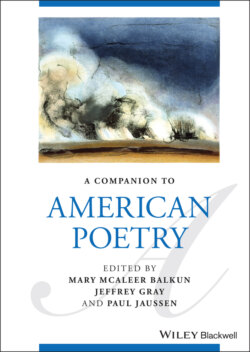Читать книгу A Companion to American Poetry - Группа авторов - Страница 40
The Poem as Scripture
Оглавление“Do I wish myself, in the deepest unconscious or subconscious layers of my being, to be the founder of a new religion?” (H.D. 1956, p. 55). So asks H.D., reflecting on her analysis with Freud. Freud does not take H.D.’s wish altogether seriously, and H.D. never becomes a prophetess per se, but there is no doubt that a powerful religious impulse informs her later work, partly released by the very analysis that enables her to question her motives in relation to belief, creativity, and gender.2 These are bound up in one of the greatest sequences in modernist poetry, Trilogy. Robert Duncan calls Trilogy “a gospel of Poetry” (Duncan 2011, p. 76), meaning, on the one hand, that poetry contains, brings forward or enacts spiritual truth, and on the other hand, that poetry, as a scripture unto itself, is that truth. As a sacred text, Trilogy reclaims and revises the hermetic traditions in which H.D. was immersed throughout her life. What she calls “spiritual realism” in The Walls Do Not Fall requires a commitment to “substitute enchantment / for sentiment” (H.D. 1983, p. 537); through magical practice, poets must seek for occult truth without settling for mere personal expression. At a time of political and cultural crisis (the poem is written in London during the Blitz), H.D. insists that her colleagues “re-value / our secret hoard” of wisdom:
explicitly, we are told
it contains
for every scribe
which is instructed,
things new
and old.
(H.D. 1983, p. 538)
The poet-scribe rewrites the ancient traditions, and in doing so, prophetically reveals new truths. Poets are “bearers of the secret wisdom, / living remnant // of the inner band / of the sanctuaries initiate” (H.D. 1983, p. 517); their goddess is the Lady who “carries a book but it is not / the tome of the ancient wisdom, // the pages, I imagine, are the blank pages / of the unwritten volume of the new” (H.D. 1983, p. 570).
H.D.’s work anticipates more recent developments in the ongoing history of poetry and belief. Her understanding of poets as a “living remnant” conflates a biblical concept, the saving remnant of the righteous, with the hermetic concept of initiation into an select order, with special access to secret wisdom. In Trilogy, these ideas are sustained in tandem with an explicit modernism that celebrates “the unwritten volume of the new.” Here, “the new” is partly a matter of genre: Trilogy and the poems which follow in its wake are not revisionary modernist epics such as The Cantos, “A,” or The Maximus Poems. They are revisionary scripture, and their newness (which is also a return to a timeless gnosis) entails a rethinking of poetry’s relation to belief and to the sacred. As Peter O’Leary writes, “When I refer to [Robert] Duncan, H.D. or [Nathaniel] Mackey as religious poets, I do not mean they have religious aspirations outside of the poem. They devote themselves to the ‘orders’ of poetry, to the ‘trouble of the unbound reference’ (as Duncan calls it) with a religious fervor, because only in poetry do they find the revelation that gives order to creation and cosmos” (O’Leary 2002, p. 25). Duncan in Passages, Mackey in The Song of the Andoumboulou and “Mu,” Ronald Johnson in ARK, Lissa Wolsak in Lightsail, and Joseph Donahue in Terra Lucida are among a number of poets for whom the long poem, often in serial form, proves to be a “revelation that gives order to creation and cosmos.”
The writing of a new scripture, however, is not without serious risk. For Duncan, the attempt to compose a testament that will bring order to the cosmos seems doomed to a fall which repeats the original gnostic disaster: “the curve of the poem / withdraws its promise” he declares in the first volume of Ground Work, and in the second volume, he is forced to acknowledge that “The Book will not hold this poetry” (Duncan 2014, pp. 470, 726). Likewise, Mackey writes in “Song of the Andoumboulou: 42” that “What we rode was a book. We / fell out of it, scattered. / The book fell out of my / hand while I slept” (Mackey 2006, p. 29). Intuiting this risk, Ronald Johnson, a more optimistic poet sharing the same ambition, observes in ARK 90 that “if Gods there be to address / read out scrapture / released planet’s snare” (Johnson 2013, p. 280). Scrapture: a portmanteau containing scripture, scrap, and rapture, could well be the three principles upon which Johnson’s long poem is based. A rapturous scripture made largely from the scraps of culture that the poet has gathered over a lifetime, ARK encourages the gods themselves to read its text, while sending its human readers toward the heavens, blissfully released from the “planet’s snare.” This is the same trajectory as Lissa Wolsak’s in Lightsail (a light sail is a device attached to a spacecraft to harness solar power for propulsion): like ARK, Lightsail envisions scripture as starship. It also returns us to H.D.’s divine Lady who reveals “the unwritten volume of the new.” Speaking of her prophetic calling, Wolsak testifies that “she appeared to us just / as in prespacetime, / then, cosmopoietically, one by one,” the goddess brings “searingly imaginative / ideas of elevation & inventiveness” (Wolsak 2018, p. 31). And it is from those ideas that comes the “theophanic light” which in turn powers Wolsak’s craft.
